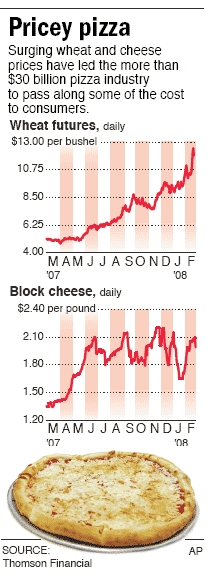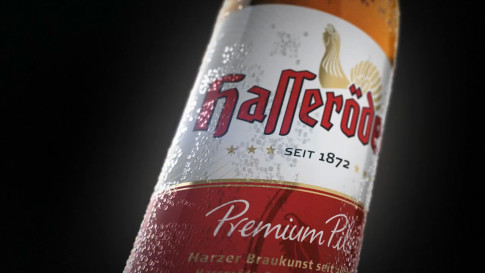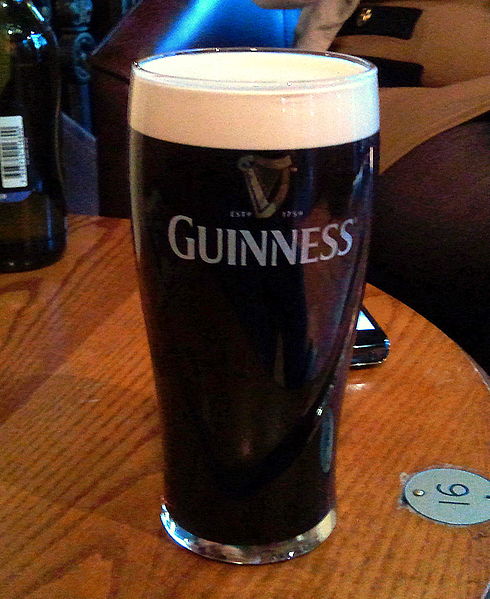If you’re looking for a sure sign the U.S. economy is headed in the wrong direction, all you need to do is look at the skyrocketing price of “recession-proof” foods: pizza, hot dogs, bagels and beer.For many Americans, the credit crunch and the mortgage mess have left their pocketbooks – and their cupboards – bare. These same consumers, many living paycheck to paycheck, have relied on these cheaper foods to keep their expenditures down. Not anymore.
In the past few months, the news has gone from bad to worse:
* Pizza makers have seen their cheese costs soar this year from $1.30 a pound to $1.76 a pound. Even worse, the flour used to make the dough has gone from $3-$7 dollars a bushel to $25 a bushel in less than a year.
* Beer makers have been forced to raise their prices because of the skyrocketing price of hops – one of the principle ingredients. The price of hops has gone from about $4 a pound in September to $40 a pound. The price of barley, beer’s other main ingredient, has nearly doubled.
* Bagel shops have struggled to hold the line on prices and keep their customers. The exploding wheat prices have made the $1 bagel a fact of life in big cities such as New York. Donuts are averaging $1.50. And many shop owners fear a wheat shortage will drive prices even higher.
* Even the lowly hot dog is getting more expensive. Gray’s Papaya, a New York hot dog institution, will be jacking up the price for its $3.50 “Recession Special” – two hot dogs and a 14-ounce drink. Nicholas Gray, owner of the frankfurter chain, has yet to set the price increase, but he indicated it is coming soon.

Overall, retail food prices rose 4 percent last year – the biggest jump in 17 years. The USDA officials predicted another 3 percent to 4 percent increase this year and continuing price hikes, faster than the pace of inflation going into 2010. And the price pinch has hit the lower-income shoppers hardest.
Why is this happening? Call it the perfect storm of inflationary pressures.
Bob Goldin, executive vice president of Technomic Inc., a food industry consulting firm, described the cost increases as a “disaster scenario,” with no real end in sight and limited ability for most to pass on the bulk of the costs to consumers.
Surging energy costs have driven up the price of transporting goods from farm to storefront. The national average for a gallon of gas jumped to $3.164, creeping closer to last May’s record of $3.227, according to AAA and the Oil Price Information Service. Diesel prices jumped 1.5 cents to a new record national average of $3.642 a gallon.
While most Americans fuel their cars with gasoline, most of the products they buy are transported by trucks, trains and ships that burn diesel. While gas prices are unlikely to rise as high as $4 a gallon, diesel may well pass that psychologically important level this spring, boosting prices of virtually every consumer product, said Tom Kloza, publisher and chief oil analyst at the Oil Price Information Service in Wall, New Jersey.
“It’s everything that gets shipped,” Kloza said of diesel fuel’s impact on the economy. “That is the one that is much scarier.”
Another reason for the sharp hike in food prices is the increasing demand for ethanol, which has driven up the price of corn – and at the same time created a shortage of wheat as farmers shift their crop to the more lucrative corn.
“There are several reasons [for higher food prices], but at the core is corn, the largest and most important of agricultural commodities,” said Bill Lapp, president of Advanced Economic Solutions.
Which brings us back to the price of flour – and the pricier pizza. Jimmy Ferrell, owner of the four Fat Jimmy’s pizza restaurants in Louisville, Ky., said the price of flour has forced him to pass the cost onto his customers. “You have to raise (prices) a couple times a year just to keep up,” he said.
Ferrell thinks the rising flour prices have hurt small operators more than national chains.
“The national chains have a lot more pull and they can negotiate prices. I don’t think we have the same buying power that a Papa John’s or a Domino’s obviously has.”
Food industry consultant Goldin doesn’t see a light at the end of the tunnel. “There are no simple solutions,” he said. “The trend will be to reduce product costs, and some of that may very well affect quality.”
So, how can budget-conscious consumers stretch their dollar? There is one – albeit artery-clogging – alternative.
Fast food companies, looking for a way to attract budget-conscious customers, are increasingly offering more food for less money. The “dollar-menu” option is growing at chains such as McDonald’s, Burger King and Quiznos.
That’s good news for diners like Boston resident Shekia Scott. While lunching with friends at a Burger King, Scott said higher prices for food and gas were hurting her budget. But, she added, “the dollar menu’s been a help.”
So there you have it. Your best option for cheap eats is a gut-busting McDonald’s double cheeseburger for a buck. Makes you want to cry in your beer … if you can afford it.
The Associated Press and CNBC contributed to this report. By Al Olson
MSNBC updated 11:18 p.m. ET Feb. 29, 2008
Source: MSNBC





